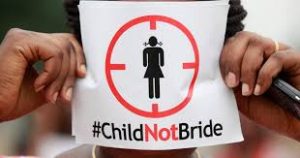By Ashiat Meikudi

Nigeria has the highest number of child marriage cases in West and Central Africa. A report by the United Nations Children’s Fund (UNICE) pecked the number of girls and women married before the age of 18 at 23.6million, adding that about 10.3 million married even before the age of 15.
The terrifying figure is a testimony to the prevalence of child poverty in the country as well as population explosion.
Child marriage continues to be a major bane on the lives of girls, especially in communities where custom and religion prevailed. In Nigeria for example, 44% of girls are inclined to marry before eighteen years.
This discriminatory societal norms and conservatism strengthened the belief of many parents from Northern Nigeria where it’s commonly practiced and strictly adhered to. The onus bedeviled from a complexity of social, cultural, religious, economic dimensions and widespread gender discrimination.
Apart from distortion and infliction of psychological headache on the victims, child marriage also subject the girls to loneliness and submissive flaws, giving them no say in their life.
Early marriage is a harmful practice in most traditional customs, driven by gender inequality and the belief that girls are inferior and the weakest creatures.
Girls on reaching the puberty stage, are forced into matrimonial homes, exposing them to various kinds of marital violence which exceed their capacity both psychologically and physically.
Meanwhile, the problem largely stems from the poor background of a household and the inability of families to live an adequate standard of life. Poverty indeed serves as a major driver to the practice of this act.
It would be a difficult feat of household with barely two-square meal to provide well
accommodation, clothing, payment for education materials or health care, hence,
These weaknesses may trigger them in giving away their wards to replete the burden of their upbringing.
Early marriage does not only abort the dreams of girls, it kills their human potential in terms of navigating their abilities forever.
Resentment is what they feel throughout their lives, most victims of the scourge faced harsh reprisals especially in the hand of their nude partner subjecting them to social isolation and domestic violence.
Therefore, education of the girl child must take a preeminent position in society.
An English Jurist, Sir William Blackstones once attributed three parental duties to the child: maintenance, protection and education.
To stem the tide of early marriage and its consequence, education of a girl child must also be taken to the priority scale.
